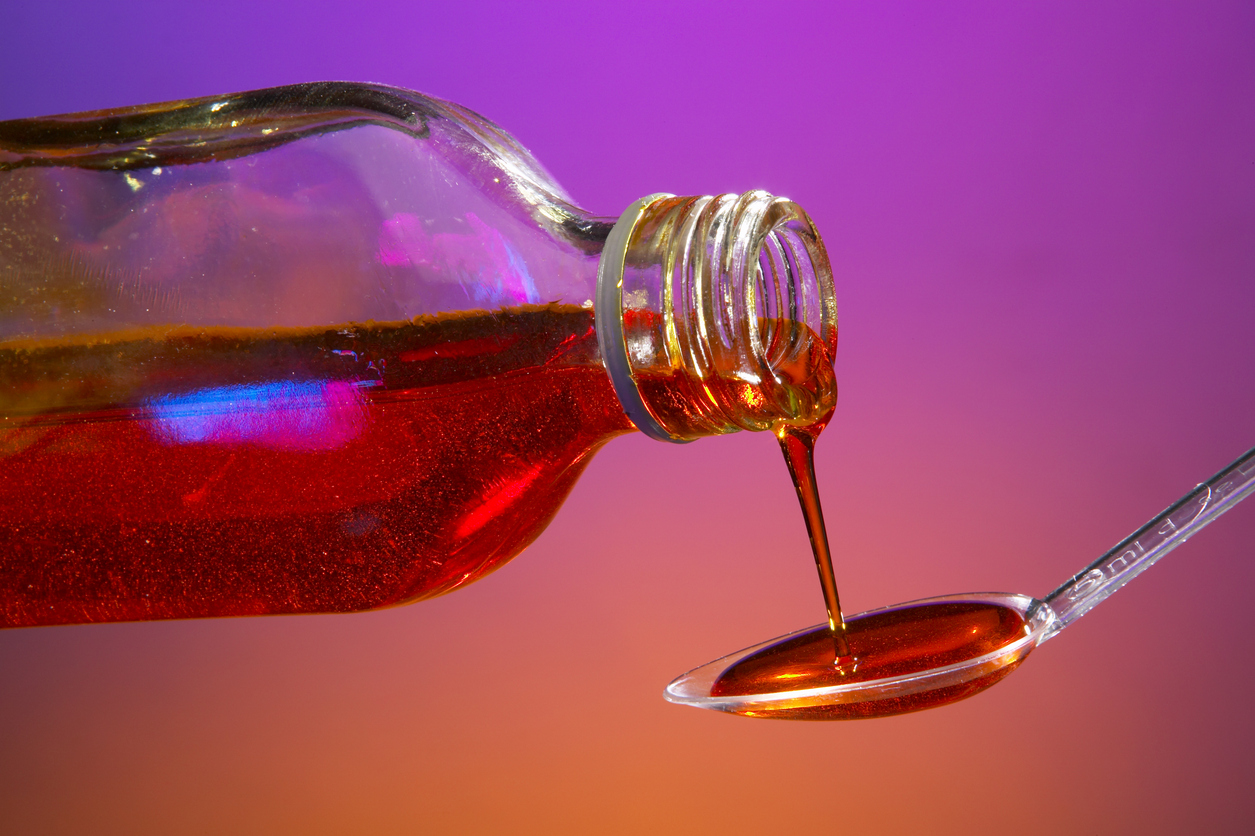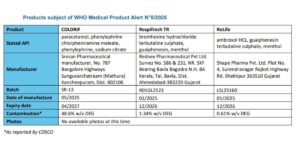Published Oct 14, 2025 | 11:31 AM ⚊ Updated Oct 14, 2025 | 11:32 AM

Cough syrup (Representational image. Credit: iStock)
Synopsis: The WHO issued a Medical Product Alert for three substandard Indian cough syrups—Coldrif, Respifresh TR, and ReLife—containing toxic Diethylene Glycol, linked to 23 child deaths. The CDSCO halted production, recalled products, and confirmed no exports. WHO urges global surveillance, warning of severe health risks, including kidney failure, and advises against using these medicines.
The World Health Organization has issued a formal Medical Product Alert concerning three substandard cough syrups manufactured in India that have been linked to at least 23 child deaths, marking an escalation of a crisis that has exposed catastrophic failures in India’s pharmaceutical regulatory system.
The alert, released after India’s Central Drugs Standard Control Organization (CDSCO) reported to WHO on 8 October 2025, identifies the presence of Diethylene Glycol (DEG)—a highly toxic industrial chemical—in at least three oral liquid medicines: Coldrif manufactured by Sresan Pharmaceutical, Respifresh TR by Rednex Pharmaceuticals, and ReLife by Shape Pharma.
“The affected products are oral liquid medicines containing active ingredients commonly used to relieve symptoms of the common cold, flu, or cough,” WHO stated in its alert, adding that the contaminated products were reportedly consumed by the affected children.
The WHO alert follows information the global health body identified on 30 September 2025 regarding localised clusters of acute illness and child fatalities in India. The CDSCO subsequently confirmed that the contaminated oral liquid medicines had been consumed by children who fell critically ill or died.
The CDSCO has confirmed that relevant state authorities have ordered an immediate halt to production at the implicated manufacturing sites and have suspended product authorisations. A recall of the contaminated products has been initiated by state authorities across affected regions.
According to WHO, the CDSCO has informed the organisation that none of the contaminated medicines have been exported from India and there is currently no evidence of illegal export. Nevertheless, WHO is encouraging National Regulatory Authorities worldwide to consider targeted market surveillance, with particular attention to informal and unregulated supply chains where products may circulate undetected.
“NRAs are also advised to carefully evaluate the risks associated with any oral liquid medicines originating from the same manufacturing sites—particularly those produced since December 2024,” WHO warned in its alert.
WHO continues to collaborate closely with Indian health authorities to monitor the situation, identify the source of contamination and mitigate any potential public health risks.
“The products identified in this alert are considered substandard as they fail to meet their quality standards and their specifications,” the organisation stated.
WHO stressed that these contaminated products pose significant risks to patients and can cause severe and potentially life-threatening illness.
“Diethylene glycol is toxic to humans when consumed, and can prove fatal. The contaminated oral liquid medicines referenced in this alert are unsafe and their use, especially in children, may result in serious injury or death,” the alert warned.

WHO alert
The organisation detailed the toxic effects, which can include abdominal pain, vomiting, diarrhoea, inability to pass urine, headache, altered mental state and acute kidney injury which may lead to death.
“To protect patients, it is essential to detect and remove these contaminated products from circulation,” WHO stated.
WHO has advised health-care professionals to report the detection of these substandard products and any incident of adverse effects, or lack of expected effects, to their National Regulatory Authorities or National Pharmacovigilance Centre.
The organisation has called for increased surveillance and diligence within the supply chains of countries and regions likely to be affected by these substandard products, with particular emphasis on increased surveillance of the informal and unregulated market.
National regulatory authorities, health authorities and law enforcement authorities have been advised to immediately notify WHO if these products are detected in their country.
“If you are in possession of any of these products, WHO recommends that you do not use them. If you, or someone you know, has, or may have, used these products, or suffered an adverse event or unexpected side-effect after use, seek immediate medical advice from a health-care professional or contact a poisons control centre,” the alert cautioned.
The WHO alert comes in the wake of a devastating tragedy that unfolded between early September and late September 2025, when at least 16 children died in Madhya Pradesh and Rajasthan after consuming contaminated cough syrup. The death toll has since risen to at least 23, with several children remaining under treatment.
Lab reports from both Madhya Pradesh and Tamil Nadu confirmed the presence of DEG in alarming concentrations—over 46 percent in the Madhya Pradesh lab report and 48.6 percent in the Tamil Nadu lab report. The permissible limit for DEG is just 0.1 percent, meaning these medicines contained nearly 500 times the acceptable concentration of the toxic substance.
The tragedy unfolded primarily in Chhindwara district, Madhya Pradesh, where six children died between 4-26 September.
In Rajasthan, deaths occurred in separate districts including Sikar, Bharatpur, and Banswara. Medical reports revealed a disturbing pattern amongst affected children who initially presented with mild fever and cold symptoms, appeared to recover, before their conditions suddenly deteriorated with critical symptoms including complete cessation of urine output, persistent vomiting, facial and body swelling and rapid progression to acute kidney failure.
The contaminated Coldrif syrup (Batch No. SR-13, manufactured in May 2025 with expiry in April 2027) was manufactured by Sresan Pharma, located in Sunguvarchathiram, Kancheepuram district, Tamil Nadu.
Following the incidents, Tamil Nadu authorities shut down the manufacturing facility after test results confirmed adulteration and imposed a statewide ban on Coldrif sales effective 1 October.
Additionally, deaths in Rajasthan were linked to Dextromethorphan Hydrobromide Syrup manufactured by Jaipur-based Kaysons Pharma. Rajasthan suspended State Drug Controller Rajaram Sharma for allegedly influencing the drug testing process and ordered suspension of supplies of all 19 medicines produced by Kaysons Pharma.
(Edited by Amit Vasudev)

